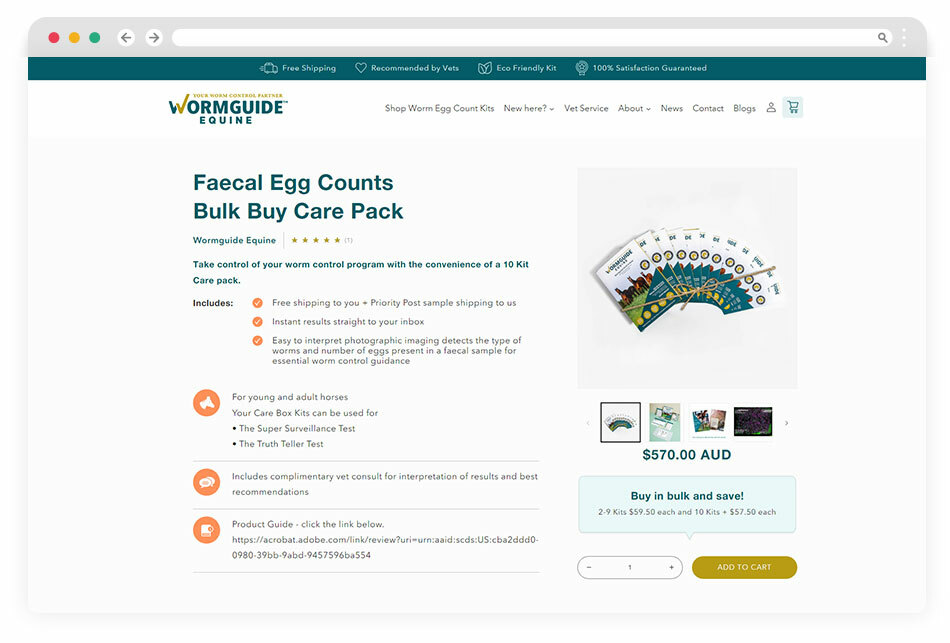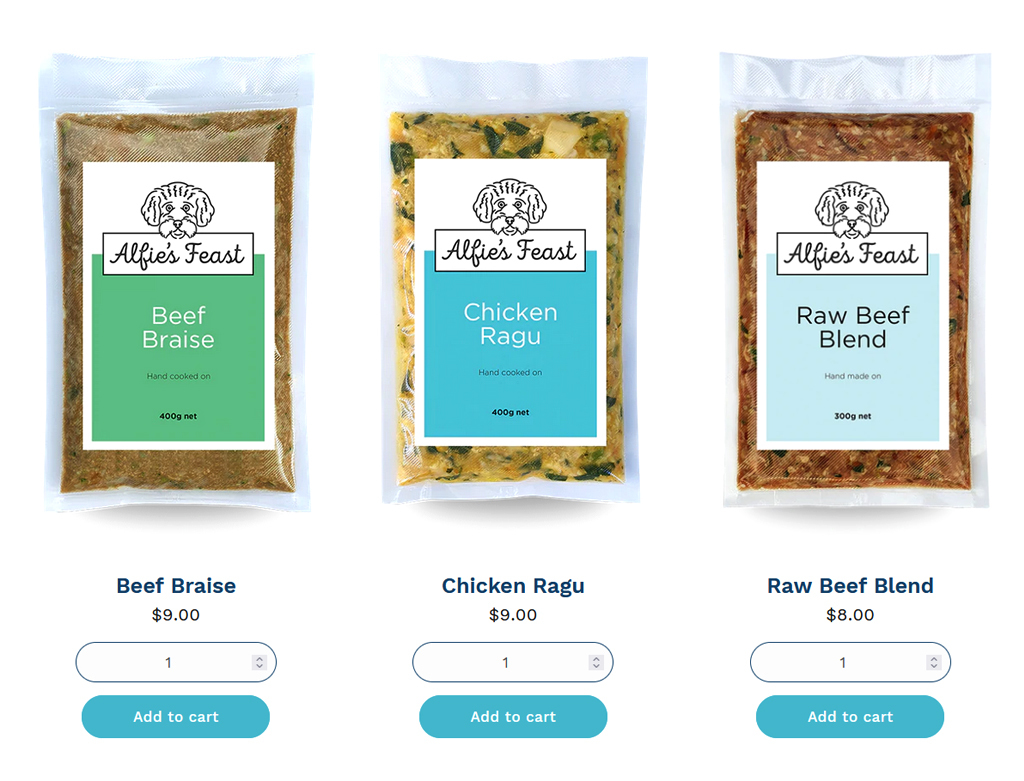I hope you enjoy reading this blog post.
If you want to discuss your website, we're here to help! Talk to Johannah.

Shopify vs. WooCommerce
Should you choose Shopify or WooCommerce
for your eCommerce website or online store?
When you have a working knowledge about websites and are trying to
build your eCommerce website, one of the first questions you will ask is “Which eCommerce platform should I use, Shopify or WooCommerce?“
Your decision on what eCommerce platform to choose depends on how involved you want to be. This is true about the technical aspects of the website – and how much working knowledge you have.
As a website designer in Melbourne we think you can use any eCommerce platform – as long as you have the proper training on how to use it. But of course, that is not the only consideration we have to think about with eCommerce websites.
In terms of which platform to use, the most popular choices for eCommerce websites is Shopify or WooCommerce for WordPress.
Both platforms have their merits. They have their own advantages and disadvantages when used for eCommerce. Confetti Design are website developers in Melbourne and we will detail the difference between these eCommerce platforms. You can explore our ecommerce portfolio or Shopify experts portfolio.
What is Shopify?
Shopify is an eCommerce platform that allows suppliers and retailers to sell any type of goods to consumers around the world, and market these goods through an online store.
This Shopify as a “one stop shop” online eCommerce platform is designed to be user friendly. Great for business owners who are not particularly web savvy. It makes it super easy to maintain and build an online store.
For a monthly fee, Shopify supports domain hosting, themes, drag and drop functionality and 24-hour support. There is also Point-of-Sale (PoS) capability with Shopify, meaning you can keep your online transactions in the one place.
What is WooCommerce?
There are two types of WordPress platforms available today:
- Hosted WordPress from WordPress.com
- Self-hosted WordPress from WordPress.org
Hosted WordPress is also a software-as-a-service (SaaS) tool, where you can pay a monthly fee to enjoy a range of features to build, develop and maintain your eCommerce website.
Self-hosted WordPress is free software called WooCommerce that is installed in your own web server (hosting). For clarification, we’ll be looking at self-hosted WordPress here.
WordPress is an open-source content management system (CMS), anyone can use or manage this software for free. There is a large number of WordPress webiste developers around the world. These website developers constantly create new themes and tools for WordPress. Most of the websites we’re seeing today are being powered by WordPress – in fact, it powers 35% of the world’s websites!
Since WordPress is an open source software, there are a lot of support forums that will help. You can fix virtually any WordPress problem reading the solutions of users who previously encountered the same problem.
Backend usability
Shopify
Shopify is incredibly user-friendly - even for those with no experience in website development!
This means that you don’t need to be a pro in coding and other technical stuff to get started with your online store.
The step by step processes is straightforward, you start building and publishing your website in just a few hours.
WooCommerce
It’s beneficial to have basic knowledge of coding to use the WordPress platform.
If you want to create an eCommerce website, you’ll need some basic knowledge of coding to use the WordPress platform.
You will also need to learn about the plugins that you can use as WordPress itself is not eCommerce ready just yet.
While this might seem a little daunting when just starting out, it is beneficial in the long run as you will be able to do simple troubleshooting on your website once you learn how the platform works!
Depending on how fast you can learn this process and how big your website is, creating a website through WordPress may take longer than doing so with Shopify.
eCommerce functionality
Shopify
Shopify is primarily built as a dedicated online store builder, which means they have developed the platform with eCommerce in mind.
This is its main advantage against WordPress, as WordPress alone is not built for online selling.
Shopify’s all-in-one package makes it easy for a small business to put up their online store quickly.
When you choose Shopify for your eCommerce store, you can sell a limitless number of goods. However it’s important to understand that each product can only have up to 100 variants and a maximum of 3 options.
However, there are apps suitable for Shopify that can remove these limits!
WooCommerce
Although we mentioned earlier that WordPress alone is not created for eCommerce, there are third party plugins that you can add to create your functional online store, such as Woocommerce or WP Ecommerce.
The key to making a beautiful yet functional online store using WordPress is to identify what functions your store needs and research on high ranking plugins that can do the job.
You can even use Shopify Lite to integrate Shopify eCommerce functions to your WordPress site!
SEO
SEO (or Search Engine Optimisation) is a key inclusion developers must consider, as it’s critical to driving qualified traffic to your website.
Regardless of whether you’re using Shopify or WordPress, you will need to optimise certain aspects of your site in order to rank better in search engines.
Shopify
Shopify has built-in SEO features that allow you to edit the meta descriptions, use SSL, automatically create 301 redirects when you change a page name, and even create XML sitemaps.
One disadvantage of using Shopify for SEO is that you cannot choose the server that will be hosting your site. This is an important consideration, as page speed - and thus a fast, reliable server - is one of the ranking elements of SEO.
We can argue that Shopify’s hosting is at par with the other hosting servers, however, it’s not the fastest.
WooCommerce
WordPress gives more flexibility in terms of optimising your website for SEO.
You can install the Yoast plugin in your website, and this tool does in-depth analysis of your content from an SEO perspective. It also gives you suggested steps to further optimise your content, and thus improve your rank in the search engine results pages.
Yoast is not available in Shopify although there are equivalent apps that some use to optimise their Shopify websites. Aside from that, WordPress allows you to choose a faster hosting which is excellent for SEO.
You can turn to Confetti Design’s SEO Services if you’re not sure on how to get your website optimised for search engines to rank you higher.
Whether your site is built on Shopify or WordPress, our SEO specialists will audit your website thoroughly to ensure that every aspect is fully and properly optimised!
Support
When you encounter a problem with your website, it’s reassuring to know that there is someone who can help you fix it.
Efficient support is especially important when your site is already live and generating money for your business!
Shopify
Shopify’s Help Center provides comprehensive solutions to a range of different problems.
It has topics that Shopify users can browse, and offers helpful video tutorials.
In the event that you can’t find a solution to your issue, Shopify also offers support through a variety of channels, including chat, email, phone, and Twitter, and offer quick response times.
There is also a Shopify Community where Shopify users share experiences they had with the platform. This is useful especially because merchants all over the world share their solutions.
WordPress
WordPress.org also has a dedicated support page to provide help on a range of topics and common problems users face.
From installation and administration to customisation and maintenance, you’ll find a ton of helpful resources here!
They also have support forums where WordPress users and web developers answer queries about WordPress and provide insight into all sorts of plugins. However, WordPress doesn’t have a support channel who will attend to inquiries individually and in real-time.
Backend usability
Shopify
Shopify is incredibly user-friendly - even for those with no experience in creating websites!
This means that you don’t need to be a pro in coding and other technical stuff to get started with your online store.
The step by step processes are straightforward, you can start building and publishing your website in just a few hours.
WooCommerce
It’s beneficial to have basic knowledge of coding to use the WordPress platform.
If you want to create an eCommerce website, you’ll need some basic knowledge of coding to use the WordPress platform.
You will also need to learn about the plugins that you can use as WordPress itself is not eCommerce ready just yet.
While this might seem a little daunting when you’re just starting out, it can also be beneficial in the long run as you will be able to do simple troubleshooting on your website once you learn how the platform works!
Depending on how fast you can learn this process and how big your website is, creating a website through WordPress may take longer than doing so with Shopify.
eCommerce functionality
Shopify
Shopify is primarily built as a dedicated online store builder, which means they have developed the platform with eCommerce in mind.
This is its main advantage against WordPress, as WordPress alone is not built for online selling.
Shopify’s all-in-one package makes it easy for a small business to put up their online store quickly.
When you choose Shopify for your eCommerce store, you can sell a limitless number of goods. However it’s important to understand that each product can only have up to 100 variants and a maximum of 3 options.
However, there are apps suitable for Shopify that can remove these limits!
WooCommerce
Although we mentioned earlier that WordPress alone is not created for eCommerce, there are third party plugins that you can add to create your functional online store, such as Woocommerce or WP Ecommerce.
The key to making a beautiful yet functional online store using WordPress is to identify what functions your store needs and research on high ranking plugins that can do the job.
You can even use Shopify Lite to integrate Shopify eCommerce functions to your WordPress site!
SEO
SEO (or Search Engine Optimisation) is a key inclusion developers must consider, as it’s critical to driving qualified traffic to your website.
Regardless of whether you’re using Shopify or WordPress, you will need to optimise certain aspects of your site in order to rank better in search engines.
Shopify
Shopify has built-in SEO features that allow you to edit the meta descriptions, use SSL, automatically create 301 redirects when you change a page name, and even create XML sitemaps.
One disadvantage of using Shopify for SEO is that you cannot choose the server that will be hosting your site. This is an important consideration, as page speed - and thus a fast, reliable server - is one of the ranking elements of SEO.
We can argue that Shopify’s hosting is at par with the other hosting servers, however, it’s not the fastest.
WooCommerce
WordPress gives more flexibility in terms of optimising your website for SEO.
You can install the Yoast plugin in your website, and this tool does in-depth analysis of your content from an SEO perspective. It also gives you suggested steps to further optimise your content, and thus improve your rank in the search engine results pages.
Yoast is not available in Shopify although there are equivalent apps that some use to optimise their Shopify websites. Aside from that, WordPress allows you to choose a faster hosting which is excellent for SEO.
You can turn to Confetti Design’s SEO Services if you’re not sure on how to get your website optimised for search engines to rank you higher.
Whether your site is built on Shopify or WordPress, our SEO specialists will audit your website thoroughly to ensure that every aspect is fully and properly optimised!
Support
When you encounter a problem with your website, it’s reassuring to know that there is someone who can help you fix it.
Efficient support is especially important when your site is already live and generating money for your business!
Shopify
Shopify’s Help Center provides comprehensive solutions to a range of different problems.
It has topics that Shopify users can browse, and offers helpful video tutorials.
In the event that you can’t find a solution to your issue, Shopify also offers support through a variety of channels, including chat, email, phone, and Twitter, and offer quick response times.
There is also a Shopify Community where Shopify users share experiences they had with the platform. This is useful especially because merchants all over the world share their solutions.
WordPress
WordPress.org also has a dedicated support page to provide help on a range of topics and common problems users face.
From installation and administration to customisation and maintenance, you’ll find a ton of helpful resources here!
They also have support forums where WordPress users and web developers answer queries about WordPress and provide insight into all sorts of plugins. However, WordPress doesn’t have a support channel who will attend to inquiries individually and in real-time.
Need eCommerce support?
Confetti Design’s web development services include the support you need when you encounter any problems with your website.
Whether it’s for Shopify or WooCommerce, our years of experience in web design has given us enough knowledge to troubleshoot and resolve any issues you find yourself facing! Find out more about eCommerce support.
Regardless of whether you choose Shopify or WordPress, Confetti Design can help you with beautiful website design and flawless web development.
Our team is proficient in performing all of your website needs—from creating your website to providing ongoing maintenance. Talk to us today.

Johannah Barton
Johannah is founder and owner of Confetti Design, a leading Melbourne Shopify Agency. Her extensive background in fashion, interior design, sales and marketing contributes to the Agencies great ability and reputation. She creates content that helps small businesses navigate the online space helping them to consider their website as a sales tool.
Read more





